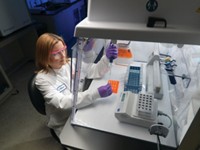Advertisement
Grab your lab coat. Let's get started
Welcome!
Welcome!
Create an account below to get 6 C&EN articles per month, receive newsletters and more - all free.
It seems this is your first time logging in online. Please enter the following information to continue.
As an ACS member you automatically get access to this site. All we need is few more details to create your reading experience.
Not you? Sign in with a different account.
Not you? Sign in with a different account.
ERROR 1
ERROR 1
ERROR 2
ERROR 2
ERROR 2
ERROR 2
ERROR 2
Password and Confirm password must match.
If you have an ACS member number, please enter it here so we can link this account to your membership. (optional)
ERROR 2
ACS values your privacy. By submitting your information, you are gaining access to C&EN and subscribing to our weekly newsletter. We use the information you provide to make your reading experience better, and we will never sell your data to third party members.
Policy
Ethics Rules Have Mixed Impact On NIH Researchers
by Britt E. Erickson
November 8, 2010
| A version of this story appeared in
Volume 88, Issue 45

Five years after NIH tightened its ethics rules, collaborations between NIH scientists and industry have decreased, NIH service on advisory boards has declined, and the majority of NIH scientists say the rules are too restrictive, according to a study in the November issue of Academic Medicine (2010, 85, 1685). The study also finds, however, that research productivity at NIH, in terms of patents and publications, has not been affected by the rules and that nearly half of NIH scientists believe the rules have increased the public’s trust in NIH. The mixed effect of the rules suggests that NIH has achieved some balance with the policy, but some observers say the negative consequences of the rules outweigh the positive. “In addition to reducing morale and possibly hampering recruitment of new staff, the conflict-of-interest regulations may lead to isolation of the NIH intramural scientists from the broader scientific community,” says William T. Talman, president of the Federation of American Societies for Experimental Biology. In a commentary accompanying the study, NIH officials point out that cooperative R&D agreements between NIH researchers and industry have returned to previous levels after a drop in 2006.




Join the conversation
Contact the reporter
Submit a Letter to the Editor for publication
Engage with us on Twitter